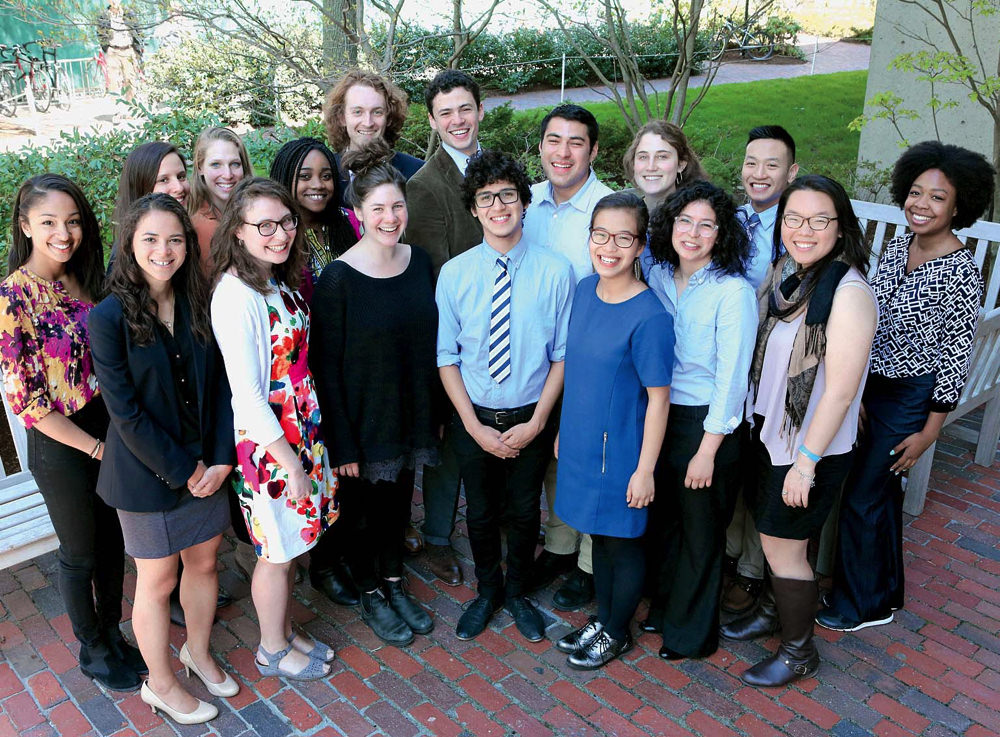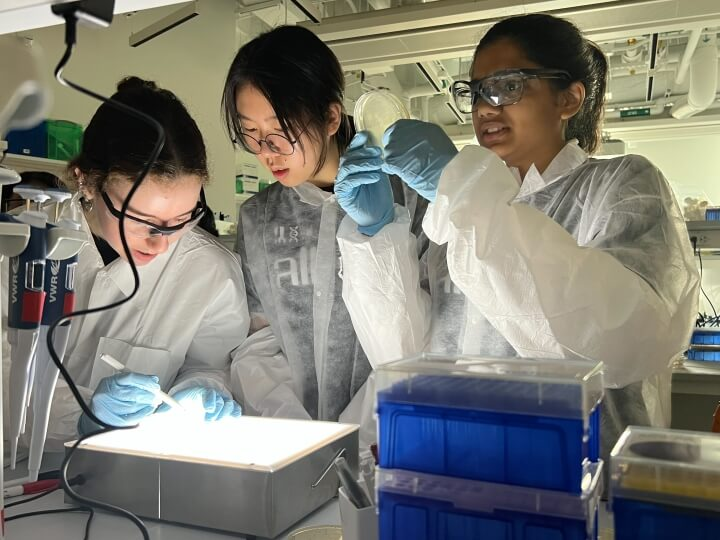
Harvard Teacher Fellows (HTF) is an innovative program that equips aspiring educators with the skills and insights necessary to thrive in the classroom, especially amid challenges like the COVID-19 pandemic. This initiative not only trains first-year teachers but also emphasizes the importance of navigating remote instruction, ensuring that these educators are well-prepared for diverse learning environments. Participants engage in rigorous teacher training programs that adapt to the evolving needs of today’s students, focusing on strategies for building relationships with pupils even in virtual settings. Fellows like María Franco and Tatiana Patiño have transformed their teaching methods to meet these unprecedented demands, showcasing resilience and creativity in overcoming the hurdles presented by remote learning. As these educators embark on their teaching journeys, their stories highlight the vital role of supportive programs like HTF in shaping the future of education.
The Harvard Teacher Fellows initiative represents a transformative approach to teacher preparation, especially for those entering the profession in challenging times. Often described as a bridge for novice educators, this program prepares them to tackle issues such as the intricacies of online learning and fostering connections with students remotely. With an emphasis on effective teacher training, fellows learn to navigate the ramifications of the pandemic, finding innovative ways to engage learners and support their academic journeys. This initiative not only celebrates the resilience of new teachers but also highlights the critical nature of relationship-building in educational success, positioning them to better serve their communities in the face of unprecedented teaching challenges.
Experiencing the Challenges of First-Year Teaching during COVID-19
The COVID-19 pandemic presented unprecedented challenges for first-year teachers, particularly those in programs like the Harvard Teacher Fellows. These novice educators were thrust into a virtual teaching landscape, often feeling isolated and facing the unique hurdles of engaging students through screens. The lack of physical presence made traditional teaching dynamics difficult to replicate, leaving many fellows, like María Franco, feeling as though they were ‘teaching into the void.’ As they navigated through these challenges, they were forced to rely heavily on technology, requiring quick adaptations to ensure learning continued. Without face-to-face interactions, establishing a connection with students became one of their greatest hurdles.
Despite the difficulties, novice teachers learned to employ creative strategies to maintain student engagement online. For instance, Tatiana Patiño utilized office hours akin to those in college, inviting students to her virtual space for both academic support and social interactions. These open channels helped break down initial barriers, showcasing the importance of building relationships even in remote settings. The pandemic not only highlighted the challenges first-year teachers faced but also reinforced the necessity for flexibility, adaptability, and resilience in the teaching profession.
Building Relationships with Students in a Virtual Context
One significant lesson that emerged for many Harvard Teacher Fellows during their first year of teaching was the importance of building strong relationships with students and families, especially in a virtual context. Programs like the Harvard Teacher Fellows emphasize interpersonal connections as essential elements for effective teaching. This became increasingly apparent as candidates like Amanda Flores and Tatiana Patiño adapted their approaches to connect with students who were often disengaged behind their screens. Patiño, for example, tapped into shared cultural experiences that resonated with her students’ backgrounds, forming a bridge between her students’ lives and their education.
Creating a supportive environment became paramount for teaching success during remote instruction. Fellows understood that without meaningful relationships, academic achievements would also suffer. Both Franco and Patiño reflected on how their personal experiences shaped the way they related to students. Franco’s story of overcoming significant obstacles resonated with her students, making her more relatable. In an era where social-emotional learning has taken center stage, these fellows realized that authentic connections are the foundation of effective teaching — an understanding that will undoubtedly influence their careers moving forward.
The Role of Teacher Training Programs in Adapting to New Norms
Teacher training programs like the Harvard Teacher Fellows play a crucial role in equipping new educators with the skills necessary to thrive in challenging environments, such as those presented by the COVID-19 pandemic. The HTF program, which offers comprehensive training focusing on both pedagogical theories and practical experiences, allowed fellows to develop critical competencies for remote instruction. The abrupt shift to online learning required these educators to rethink their lesson plans and find alternative ways to engage students, resulting in a remarkable evolution of teaching methodologies.
Moreover, the collaborative nature of the Harvard Teacher Fellows program fostered a sense of community among fellows, enabling them to share insights and strategies as they navigated remote teaching. This mutual support became an essential resource during a tumultuous year. The focus on adapting to new norms and learning how to facilitate effective online instruction enhanced their overall readiness for a future where technology will play an integral role in education. Therefore, comprehensive teacher training programs remain vital in preparing educators to address both existing and emerging challenges in the classroom.
Adapting Pedagogy for Remote Instruction
As teacher educators navigated the challenges of remote instruction, it became clear that traditional pedagogical methods needed significant adaptation. First-year teachers from the Harvard Teacher Fellows learned to pivot quickly, utilizing digital platforms to deliver lessons that engaged students despite the physical distance. This experience hastened their growth as educators, requiring them to embrace innovative technology in their teaching. With guidance from professors and through collaborative efforts, fellows transformed their understanding of teaching to fit a remote learning environment.
Effective online pedagogy also emphasized interactive elements that fostered student participation, even when teaching remotely. Fellows like Franco and Flores discovered the importance of creating a dynamic online classroom atmosphere where students felt comfortable to express themselves. By incorporating interactive tools and engaging storytelling, they were able to maintain student interest during lessons. Such adaptations not only enhanced their teaching effectiveness but also prepared them to face various teaching contexts, emphasizing the necessity of flexibility in educators’ approaches.
Finding Success During Hybrid Learning Environments
Navigating hybrid learning environments became a new reality for many teachers during the pandemic, presenting unique sets of challenges for Harvard Teacher Fellows. These teachers, like Amanda Flores, learned to balance instructing both in-person and remote students simultaneously, which required a high level of organization and adaptability. The experience highlighted the necessity of effectively managing classroom dynamics and ensuring that all students, regardless of their learning mode, received equal attention and support.
The fellows recognized that hybrid classes demanded a blend of strategies from both online and traditional classroom settings. Teachers adapted their lessons to leverage the advantages of in-person interactions while utilizing online tools to enhance student engagement. This balancing act allowed them to build relationships with students in varied formats while addressing diverse learning needs. Ultimately, this experience strengthened their pedagogical skills and confidence as educators in an ever-changing educational landscape.
The Importance of Social-Emotional Learning in Education
The pandemic brought a renewed focus on social-emotional learning (SEL) within the educational framework, and Harvard Teacher Fellows embraced this shift in their teaching philosophy. With students grappling with the emotional fallout of COVID-19, students’ mental well-being became an essential part of the learning process. Fellows learned to integrate SEL into their curriculums, ensuring that their classrooms were not just environments for academic growth, but also spaces where students felt supported emotionally.
Educators like Tatiana Patiño expressed the significance of understanding their students holistically, recognizing that learning cannot occur in isolation from emotional and social factors. This emphasis on SEL helped fellows build stronger connections with their students, which ultimately increased student engagement and academic success. By prioritizing emotional health alongside academic instruction, these new teachers cultivated classrooms that nurtured resilience and fostered an environment conducive to learning.
The Role of Mentorship in Teacher Development
Mentorship emerged as a critical component of success for first-year teachers navigating the complexities of remote instruction and student engagement. The Harvard Teacher Fellows program provided opportunities for inspiring mentorship relationships, allowing novice teachers to seek guidance from both experienced educators and peers. This connection proved invaluable during a year filled with unprecedented challenges, as it reinforced a collaborative spirit among educators.
Fellows like Amanda Flores attributed much of their growth and development to the mentorship received throughout their teaching journey. Regular check-ins and discussions with mentors provided insights tailored to their specific experiences. This ongoing support mechanism not only enhanced their pedagogical practices but also built a professional support network that ultimately fostered a sense of belonging in the educational field.
Strategies for Engaging Students Despite the Distance
Despite the enormity of the task, Harvard Teacher Fellows discovered several effective strategies for engaging students through remote instruction. Fellows learned that utilizing a variety of digital tools, such as interactive presentations, breakout rooms for collaborative discussions, and gamified learning experiences helped maintain student interest during lessons. Moreover, designing diverse and dynamic content became crucial, as engaging students virtually is markedly different from traditional face-to-face interactions.
María Franco and her peers found that personal anecdotes and relatable stories served as powerful engagement tools in a virtual classroom. Drawing from their own experiences allowed fellows to connect with students on a deeper level, fostering an environment where students felt seen and valued. Such personal touches contributed significantly to building rapport during a time when physical interaction was limited.
Lessons Learned from Teaching During a Crisis
Teaching during the COVID-19 pandemic offered invaluable lessons for first-year educators, particularly those involved in the Harvard Teacher Fellows program. The challenges of remote instruction, classroom management, and building relationships with students underscored the importance of adaptability and resilience in teaching. Fellows developed strategies not only for lesson delivery but also for maintaining student engagement, even through screens. The experience provided a foundation for future practices, emphasizing flexibility and innovative problem-solving as crucial skills in education.
Moreover, the pandemic underscored the necessity of being attuned to the diverse needs of students, highlighting the importance of fostering strong relationships with both students and their families. Harvard Teacher Fellows like Tatiana Patiño recognized that effective education transcends academic instruction; it requires understanding the individual circumstances and emotional well-being of students. Looking forward, these lessons will undoubtedly shape their teaching philosophies and practices as they progress in their careers.
Frequently Asked Questions
What is the Harvard Teacher Fellows program and who does it serve?
The Harvard Teacher Fellows (HTF) program is designed for college seniors and recent graduates who aspire to become teachers. It provides comprehensive training, including a teaching residency in partner schools, while addressing the unique challenges first-year teachers face, particularly in the context of COVID-19.
How did the COVID-19 pandemic impact the Harvard Teacher Fellows’ teaching experiences?
The COVID-19 pandemic significantly affected the Harvard Teacher Fellows by necessitating a shift from traditional in-person teaching to remote instruction. Fellows had to adapt their methods for engaging students through digital platforms, often facing challenges like Zoom black screens and the need for innovative strategies to build relationships with students.
What challenges do first-year teachers in the Harvard Teacher Fellows program face during the pandemic?
First-year teachers in the Harvard Teacher Fellows program faced numerous challenges during the pandemic, including creating engaging remote lessons, managing classroom behavior in a hybrid environment, and navigating the emotional dynamics of teaching students who may have been experiencing difficulties at home.
How does the Harvard Teacher Fellows program support building relationships with students for first-year teachers?
The Harvard Teacher Fellows program emphasizes the importance of developing strong relationships with students and their families. During the pandemic, this became even more critical, as fellows learned to extend their teaching practices beyond academics to support students’ social-emotional needs and personal contexts.
In what ways did remote instruction during the pandemic change teacher training in the Harvard Teacher Fellows program?
Remote instruction necessitated a curriculum shift in the Harvard Teacher Fellows program, with a greater focus on technology integration, online engagement strategies, and methods for facilitating connections with students in a virtual environment, thus transforming traditional teacher training approaches.
What skills did Harvard Teacher Fellows acquire during the pandemic that will benefit them as future educators?
Harvard Teacher Fellows developed important skills during the pandemic, including adaptability to online learning tools, creativity in lesson delivery, and enhanced strategies for fostering relationships with diverse student populations, which are crucial for their growth as effective educators.
How does the Harvard Teacher Fellows program address COVID-19 teaching challenges?
The Harvard Teacher Fellows program proactively addresses COVID-19 teaching challenges by providing fellowships that focus on practical solutions for remote instruction, mentorship from experienced educators, and a supportive community that collaborates to tackle the unique hurdles of teaching during a pandemic.
What impact does the Harvard Teacher Fellows program have on first-year teachers’ confidence and teaching practice?
The Harvard Teacher Fellows program significantly boosts first-year teachers’ confidence by offering robust training and support, particularly in navigating the complexities of teaching during the pandemic. This mentorship helps fellows feel equipped to handle the pressures of remote instruction and build effective teaching practices.
What are the long-term benefits of participating in the Harvard Teacher Fellows program for new educators?
Participating in the Harvard Teacher Fellows program offers new educators long-term benefits, including a strong foundation in teaching methods, valuable classroom experience, and a professional network that enhances their career opportunities in education, particularly in supporting diverse student needs.
How are Harvard Teacher Fellows contributing to education in Greater Boston post-COVID-19?
Post-COVID-19, Harvard Teacher Fellows are contributing to education in Greater Boston by engaging in teaching residencies that focus on recovery and support for students affected by the pandemic, implementing summer programs, and actively participating in their local school communities.
| Key Points |
|---|
| María Franco, Tatiana Patiño, and Amanda Flores are part of the Harvard Teacher Fellows program. |
| Fellows launched their teaching careers amid the COVID pandemic, requiring significant adjustments to their training and teaching methods. |
| The program typically includes five semesters but was reduced to four semesters of coursework followed by a one-year residency due to COVID-19. |
| Fellows initially taught online, leading to experiences with ‘Zoom black boxes’ and challenges in building connections with students. |
| Despite these challenges, online teaching allowed novice teachers to focus on content and pedagogy without traditional classroom management issues. |
| Fellows found ways to connect with students through shared cultural experiences and personal stories, making learning more relatable. |
| The program emphasizes the importance of building relationships with students and their families, especially highlighted during remote instruction. |
| The retention rate for the Harvard Teacher Fellows program is approximately 80%, showing strong commitment among participants. |
| Following the pandemic, the fellows continue to teach and support students through summer school initiatives and partnerships with local schools. |
Summary
Harvard Teacher Fellows embody resilience and adaptability, showcasing how first-time educators can thrive even in challenging circumstances like the COVID-19 pandemic. Through their unique experiences of transitioning to online teaching and forming meaningful relationships with students, these fellows have gained invaluable insights about the importance of connection and adaptability in education. As they move forward in their careers, their commitment not only to teaching but also to enriching the lives of their students remains steadfast and inspiring.







